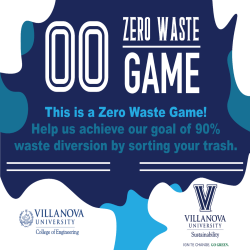Villanova University to Host Zero Waste Basketball Game on February 19

VILLANOVA, Pa. – On Saturday, February 19, Villanova will host its fifth Zero Waste Men’s Basketball game when the Wildcats host Georgetown University at the Finneran Pavilion. A Zero Waste game is where 90 percent or more of the waste generated during the game is diverted from the trash stream to recycling and composting.
The University’s Zero Waste games are carried out in collaboration with Campus Race to Zero Waste, formerly Recyclemania. Villanova’s first Zero Waste game was held in 2015 and subsequently the following three years until the Pavilion was closed for renovation. Games restarted in 2020 at the newly renovated Finneran Pavilion, with another pause in 2021 due to COVID-19.
Villanova’s Zero Waste initiative is led by its Facilities Management Department, in partnership with Villanova Athletics and Spectra, who alter the food service to include more compostable solutions. To ensure success, a team of volunteers will sort through waste once it is pulled from the Finneran Pavilion so that each item is processed correctly and weighed for documentation.
“This is a great opportunity for sustainability to reach a new audience and we hope our efforts to educate attendees around proper waste diversion practices live beyond a single basketball game,” says Liesel Schwarz, Villanova’s Sustainability Manager, “The best sustainability events come about through partnership. Villanova Athletics, Grounds, Custodial Services, and Spectra have been great partners in planning for and the execution of the annual Zero Waste basketball game.”
In 2007, Villanova University President the Rev. Peter M. Donohue, OSA, PhD signed the American College & University Presidents’ Climate Commitment. Further advancing the University’s pledge to sustainability, he then established the sustainable leadership council. The committee is composed of faculty, staff, and students from across the University and is charged with taking action in all aspects of campus sustainability. Since then, Villanova has expanded its sustainability efforts to include the launch of its master’s degree programs in Environmental Science and Sustainable Engineering.
In addition, the University has nine LEED-certified buildings on campus and has committed to LEED certification for all new construction and major renovation projects going forward. In April 2014, Father Donohue signed the St. Francis Pledge, to “protect God's Creation and advocate on behalf of people in poverty who face the hardest impacts of global climate change.”
Villanova continues to be recognized as one of the nation’s greenest colleges, having received national recognition for its commitment to sustainability by a number of organizations including the Association for the Advancement of Sustainability in Higher Education (AASHE). Villanova recycles and composts up to 48 percent (22 percent of consumer waste) of its waste. The University has installed over 90 hydration stations on campus to make it more convenient to fill up reusable water bottles. In 2016, Villanova received a Tree Campus Higher Education recognition from the Arbor Day Foundation for its commitment to promote healthy trees and engage students and staff in the spirit of conservation. Through Unitas, Veritas, and Caritas, Villanova’s approach to sustainability emphasizes social justice and community service. The University continues to incorporate its commitment to the environment into its community service initiatives.
About Villanova University: Since 1842, Villanova University’s Augustinian Catholic intellectual tradition has been the cornerstone of an academic community in which students learn to think critically, act compassionately and succeed while serving others. There are more than 10,000 undergraduate, graduate and law students in the University's six colleges—the College of Liberal Arts and Sciences, the Villanova School of Business, the College of Engineering, the M. Louise Fitzpatrick College of Nursing, the College of Professional Studies and the Villanova University Charles Widger School of Law. Ranked among the nation’s top universities, Villanova supports its students’ intellectual growth and prepares them to become ethical leaders who create positive change everywhere life takes them. For more, visit www.villanova.edu.
